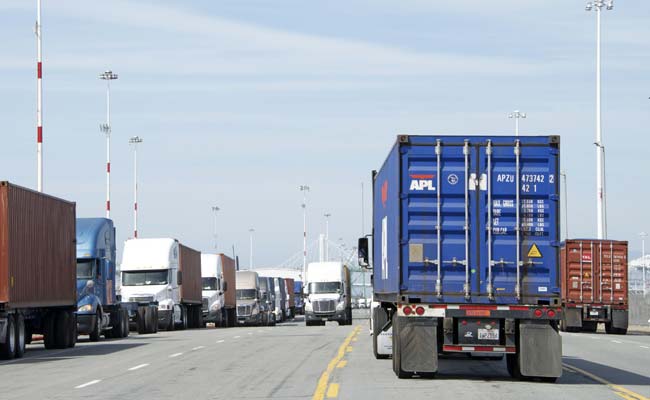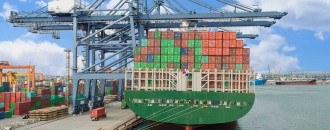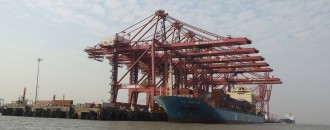
Congestion grounds export consignments at Gateway Terminals India
Sisir Pradhan | The Dollar Business  Export container movement at Gateway Terminals India has been affected after the terminal closed south entrance gate starting from Sunday, April 12, 2015. Brihanmumbai Custom House Agents’ Association (BCHAA) has issued a ‘trade advisory’ in this regard. The association’s export committee chairman Milan Desai in an official ‘trade advisory’ said that the south gate entrance to the terminal was closed on April 12, 2015 and is non-functional. The outside queue for the terminal was about six kms with trailers in two rows. The gate operation was also very slow and trailer turnaround time at the terminal was on average five hours. Similarly, traffic queue outside the gates of Jawaharlal Nehru Port Trust (JNPT) operated Jawaharlal Nehru Port Container Terminal (JNPCT) was one km and DP World operated Nhava Sheva International Container Terminal (NSICT) was two km, the BCHAA release claimed. “Considering the above and on the basis of Trade Advisory dated April 13, 2015 issued by the CFS Association, members are hereby informed that GTI shall not be accepting any export container by road for next three days,” the BCHAA release said. Our e-mail queries to the officials of GTI and NSICT, seeking the cause for the congestion and the measures being taken to ease the traffic, remained unanswered till this report went for publication. However, a top official of JNPT, on conditions of anonymity, told The Dollar Business that the congestion is going on because GTI authorities are accepting bookings of containers way above their capacity. The port authorities are in discussion with the terminal operator to resolve the issue. The JNPT official further said that Rail Mounted Quay Cranes at JNPCT are undergoing some maintenance work due to which the cranes are not operating at full capacity. Notably, GTI is one of three terminals currently operating at JNP, India’s largest container port, accounting for 45% of JNP’s throughput, and approximately 20% of India’s total container traffic. Hence any disruption in traffic movement at GTI will not only affect the container movement at the terminal but also it will have an adverse effect on India’s foreign trade. Notably, during our field visit to the terminal on March 13, 2015, we did not find any congestion in and outside the terminal. At that time we interacted with some stake holders of JNPT and users of GTI and most of them gave a good report on the terminal’s performance. Trade insiders, however, opine that apart from overbooking of containers by GTI, the other reason for the congestion is the overall infrastructure bottleneck at state and national highways. GTI is connected with the rest of the country via NH-4B, NH-4 and NH-17. Similarly, it is connected to the national railway network at Panvel junction. However, a majority of cargo to and from terminals at JNP is moved via road and congestion at the highways leads to disruption of traffic at the port. Various stake holders told The Dollar Business that GTI officials need to relook their business model and shouldn’t close the gates at will, which leads to disruption of traffic movement and results in financial loss to exporters and importers and other stake holders. Explaining the reasons for the congestion, a cargo clearing and forwarding agent told The Dollar Business, “The congestion is due to the working style of GTI, e.g., they close or open gates at their own convenience. The delay in EXIM cargo movement is there for the last few months and the reason is only known to the concerned authorities. Shipping lines and container freight stations are charging congestion charges in their invoice which is over and above the cost to EXIM trade.” In the advent of the congestion, leading ship liner NYK Line India has also issued a ‘trade advisory’ on April 14, 2015 which says, “GTI terminal is experiencing berthing delay for all vessels due to ‘Go Slow’ and berth congestion. Furthermore, since April 13, 2015, midnight, there is a shortage of RTG (Rubber-Tyred Gantry) crane operators for three days due to local village festival (Jatra). Export movements by road will also be closed from April 14, 2015, 00:01 hours till April 16, 2015, 08:00 hrs. On May 1, 2015 from 08:00hrs till 17:00 hours there will be Nhava Sheva Port annual power shut down for maintenance which will impact the terminal operations adversely. For Week 17, 18, 19 and 20, terminal will be able to do only 70% of the pro-forma moves. However, if the situation improves in between then the terminal will review the same and keep all concerned informed suitably.” Giving details of the effect on trade due to the congestion, sources said that GTI close and open their gates irregularly and since the approach road for all the three terminals, JNPCT, NSICT and GTI, is same and due to closer of one gate traffic at the approach road gets congested. Moreover, if one container doesn’t reach a particular planned vessel it has a lot of cascading effects. For example, it leads to failure of shipper commitment and as shipper will not be able to get bill of lading on time, so he/she cannot negotiate documents with bank and due to which payment from bank gets delayed. Meanwhile, a trade advisory on the official website of GTI dated April 2, 2015 says, “We have noticed that for the past few days there is traffic congestion on the approach roads to the port. This is being caused by dumper traffic movement which are involved in land reclamation for the new 330 meter fourth terminal of JNPT. There is a daily movement of close to 1,500 dumpers which is expected to increase in the coming days. This dumper movement is using the existing and already limited approach road infrastructure to the port. Furthermore, one lane of the approach road towards GTI has been barricaded by JNPT exclusively for dumper movements. This has been done to ensure that dumper traffic does not mix with the container traffic, however this is adversely impacting our gate movements.” Notably, GTI also known as APM Terminals Mumbai is a 74:26 joint venture between APM Terminals and Container Corporation of India. Incorporated in July 2004, GTI operates one of the three terminals at JNPT on a BOT (build-operate-transfer) basis for a period of 30 years.
Export container movement at Gateway Terminals India has been affected after the terminal closed south entrance gate starting from Sunday, April 12, 2015. Brihanmumbai Custom House Agents’ Association (BCHAA) has issued a ‘trade advisory’ in this regard. The association’s export committee chairman Milan Desai in an official ‘trade advisory’ said that the south gate entrance to the terminal was closed on April 12, 2015 and is non-functional. The outside queue for the terminal was about six kms with trailers in two rows. The gate operation was also very slow and trailer turnaround time at the terminal was on average five hours. Similarly, traffic queue outside the gates of Jawaharlal Nehru Port Trust (JNPT) operated Jawaharlal Nehru Port Container Terminal (JNPCT) was one km and DP World operated Nhava Sheva International Container Terminal (NSICT) was two km, the BCHAA release claimed. “Considering the above and on the basis of Trade Advisory dated April 13, 2015 issued by the CFS Association, members are hereby informed that GTI shall not be accepting any export container by road for next three days,” the BCHAA release said. Our e-mail queries to the officials of GTI and NSICT, seeking the cause for the congestion and the measures being taken to ease the traffic, remained unanswered till this report went for publication. However, a top official of JNPT, on conditions of anonymity, told The Dollar Business that the congestion is going on because GTI authorities are accepting bookings of containers way above their capacity. The port authorities are in discussion with the terminal operator to resolve the issue. The JNPT official further said that Rail Mounted Quay Cranes at JNPCT are undergoing some maintenance work due to which the cranes are not operating at full capacity. Notably, GTI is one of three terminals currently operating at JNP, India’s largest container port, accounting for 45% of JNP’s throughput, and approximately 20% of India’s total container traffic. Hence any disruption in traffic movement at GTI will not only affect the container movement at the terminal but also it will have an adverse effect on India’s foreign trade. Notably, during our field visit to the terminal on March 13, 2015, we did not find any congestion in and outside the terminal. At that time we interacted with some stake holders of JNPT and users of GTI and most of them gave a good report on the terminal’s performance. Trade insiders, however, opine that apart from overbooking of containers by GTI, the other reason for the congestion is the overall infrastructure bottleneck at state and national highways. GTI is connected with the rest of the country via NH-4B, NH-4 and NH-17. Similarly, it is connected to the national railway network at Panvel junction. However, a majority of cargo to and from terminals at JNP is moved via road and congestion at the highways leads to disruption of traffic at the port. Various stake holders told The Dollar Business that GTI officials need to relook their business model and shouldn’t close the gates at will, which leads to disruption of traffic movement and results in financial loss to exporters and importers and other stake holders. Explaining the reasons for the congestion, a cargo clearing and forwarding agent told The Dollar Business, “The congestion is due to the working style of GTI, e.g., they close or open gates at their own convenience. The delay in EXIM cargo movement is there for the last few months and the reason is only known to the concerned authorities. Shipping lines and container freight stations are charging congestion charges in their invoice which is over and above the cost to EXIM trade.” In the advent of the congestion, leading ship liner NYK Line India has also issued a ‘trade advisory’ on April 14, 2015 which says, “GTI terminal is experiencing berthing delay for all vessels due to ‘Go Slow’ and berth congestion. Furthermore, since April 13, 2015, midnight, there is a shortage of RTG (Rubber-Tyred Gantry) crane operators for three days due to local village festival (Jatra). Export movements by road will also be closed from April 14, 2015, 00:01 hours till April 16, 2015, 08:00 hrs. On May 1, 2015 from 08:00hrs till 17:00 hours there will be Nhava Sheva Port annual power shut down for maintenance which will impact the terminal operations adversely. For Week 17, 18, 19 and 20, terminal will be able to do only 70% of the pro-forma moves. However, if the situation improves in between then the terminal will review the same and keep all concerned informed suitably.” Giving details of the effect on trade due to the congestion, sources said that GTI close and open their gates irregularly and since the approach road for all the three terminals, JNPCT, NSICT and GTI, is same and due to closer of one gate traffic at the approach road gets congested. Moreover, if one container doesn’t reach a particular planned vessel it has a lot of cascading effects. For example, it leads to failure of shipper commitment and as shipper will not be able to get bill of lading on time, so he/she cannot negotiate documents with bank and due to which payment from bank gets delayed. Meanwhile, a trade advisory on the official website of GTI dated April 2, 2015 says, “We have noticed that for the past few days there is traffic congestion on the approach roads to the port. This is being caused by dumper traffic movement which are involved in land reclamation for the new 330 meter fourth terminal of JNPT. There is a daily movement of close to 1,500 dumpers which is expected to increase in the coming days. This dumper movement is using the existing and already limited approach road infrastructure to the port. Furthermore, one lane of the approach road towards GTI has been barricaded by JNPT exclusively for dumper movements. This has been done to ensure that dumper traffic does not mix with the container traffic, however this is adversely impacting our gate movements.” Notably, GTI also known as APM Terminals Mumbai is a 74:26 joint venture between APM Terminals and Container Corporation of India. Incorporated in July 2004, GTI operates one of the three terminals at JNPT on a BOT (build-operate-transfer) basis for a period of 30 years.
This article was published on April 15, 2015 – 2.45 pm IST.






 to success.
to success.